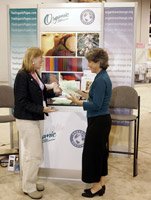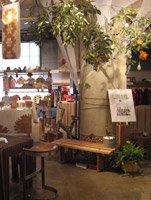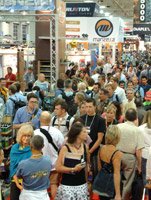Fair Trade
Trade shows are going green
Imagine building a village, inviting thousands of residents, and four days later tearing it down. Doesn’t sound like a very efficient use of resources, does it? “A trade show is one of the most wasteful things in the world,” says Kenji Haroutunian, show director for trade show Outdoor Retailer. That’s a bold admission from an entity that’s been putting on trade shows for 26 years. But today Outdoor Retailer is at the forefront of helping to make trade shows less wasteful. For the past two years it has powered the show (the next of which takes place Aug. 9–12 in Salt Lake City) exclusively on wind energy, and with each new show Outdoor Retailer takes another green step forward, such as finding recycled carpets or biodegradable concessionware.
All apparel trade shows, in fact, are finding ways to go green by installing simple things like recycling bins to more elaborate steps, like Outdoor Retailer’s wind-powered energy. They’re also taking active steps to recruit, present, and reward eco-conscious exhibitors.
Outdoor Retailer caters to human-powered outdoor sports like kayaking, hiking, skiing, camping, and rock climbing, and draws a number of large apparel companies such as Patagonia, Timberland, and Columbia. It has also devoted a section of the show floor to newer apparel companies with an eco angle, drawing about 20 exhibitors to the last show.
It’s an obvious step, as it’s exactly what Outdoor Retailer’s attendees are looking for. “Retail stores in outdoor are highly inclined to buy products that have a green message,” says Haroutunian, “because it resonates with their clientele. The kind of person shopping for apparel at Wal-Mart or Saks Fifth Avenue is not the same person who goes to a mountaineering shop. So they’re going to feature brands that have an environmental sensitivity.”
Though in the outdoor market green has been common since the ’70s (when it was called ecology), “for the first time I’m seeing companies employ green messages and practices because it’s good for their business,” says Haroutunian, “not because they’re trying to be part of a trend. They’re actually seeing bottom-line results.”
Those results, says Haroutunian, include the cost benefits of having a paperless media kit. “You can cut your print costs by 50 percent because people will get a jump drive instead.” This also helps editors covering trade shows by reducing the number of paper-filled boxes they have to ship back to the office. And about two and a half years ago, Outdoor Retailer started a program called “Green Steps.”
“If you go to outdoorretailer.com and click ’Green Steps,’” explains Haroutunian, “you’ll see a list of hundreds of ideas companies have implemented to show their unique way of being green. It’s a free platform for anyone in the industry to contribute up to five bullet points.
“What it’s ended up constituting,” he continues, “is a best-practices list covering everything from powering your headquarters on wind energy to having an incentive program for employees to ride a bike to work.”
About 40 companies pay Outdoor Retailer a small fee to become a “Green Steps” sponsor, for which they are recognized in the show guide and on the show floor. Outdoor Retailer uses the proceeds to help “green” the show with things like recycled carpets and biodegradable concessionware.
Outdoor Retailer’s parent company, Nielsen Sports Group, will soon be launching Green Steps at the Action Sports Retailer Trade Expo and other trade shows it owns.
Eco not just a trend for D&A
“For Designers and Agents, green is not the new black,” says Barbara Kramer. “It is everyone’s responsibility to look into our lives and see how we can become more eco-conscious. This is not a trend for us,” she adds.
Although D&A uses existing showroom buildings rather than empty convention centers, it faces the challenge of staging 12 shows per year (in Los Angeles, New York, and London) rather than just two.
In May 2006, D&A decided to start a recycling program after research revealed that none of the buildings the trade show uses have recycling bins for trash. Show sponsor Fiji Water stepped forward by donating several large bins. D&A labeled one for glass, plastic, and trash. “People don’t read signs,” recalls Kramer. “No one cared.”
So, for the next show, D&A created elaborate signs explaining exactly what refuse should be put where, “and 20 percent of the people cared. People really need to be educated,” says Kramer, “so that’s what we’re doing. And we’re in it for the long haul, so we just have to be patient.”
D&A is considering asking the Boy Scouts and Girl Scouts to have kids monitor the recycling bins in exchange for merit badges.
Other steps at D&A have been greeted more warmly. At the May show in New York, it launched a new space called “The Green Room,” which housed a dozen eco-conscious exhibitors with apparel and beauty products, and Global Connect and Green 360 offered consultation on how retailers can go green.
Designers and Agents also found biodegradable plates and utensils for the eating area, and printed all paper matter, such as the directory and invitation, on recycled paper. “As much as we could stretch ourselves, we did,” says Kramer.
These green steps will be implemented at D&A shows in all locations.
Pool s(eco)nds the motion
According to Mindy Wiener, director of operations for the Pooltradeshow, the country is experiencing a “social awakening” causing eco-conscious initiatives to be implemented at an accelerated rate. “We’ve all said ’Now is the time,’” Wiener says of her peers in the apparel industry.
The time came for Pool when Wiener came to realize just how wasteful trade shows can be. “I was really getting depressed,” she says. “You build this temporary structure and then it goes away and you’re left with all this waste.”
Exhibitors would routinely leave behind booth props like rugs, television sets, lamps, art, and huge amounts of printed matter. Previously this would all be thrown away, but now Pool has hired a firm that specializes in recycling or donating this kind of waste.
At the next show, scheduled for Aug. 27–29 in Las Vegas, Pool will unveil a new area called “s(eco)nd” in response to many attendees’ asking which exhibitors were green.
“We’ve been working to raise awareness for the last few seasons but have not felt like the timing was quite right to take a stand,” says Wiener. “Now there is no doubt that businesses are implementing changes that are impacting the industry. By introducing the thought that ’it only takes a s(eco)nd to change the world,’ s(eco)nd will allow us to take a look at how we do business and will encourage our audience to rethink their most basic day-to-day habits.”
Nothing magic about it
At MAGIC, owned by Advanstar Communications, which also owns Pool, the show’s popular seminars are increasingly addressing environmental issues. Topics for the August show include “Organic Cotton, Wool, and Leather,” “Sustainability,” “Organic Fiber on the Cutting Edge,” and “Are You Selling Toxic Apparel and Footwear?”
For the Sourcing@MAGIC area, the trade show has had longstanding partnerships with Organic Exchange and the Organic Trade Association. And while MAGIC has opted to keep exhibitors in their own area on the show floor rather than create a green section, says general manager Christopher McCabe, eco-friendly companies are marked “green” in the show directory.
WSA takes a step forward
If you think you can only go green from the ankle up, you’re wrong. While hemp, bamboo, and organic cotton are all geared toward apparel, you can go green in footwear and not even have to don lime-colored clogs. For example, leather can be treated nontoxically, and product packaging can be recycled or biodegradable, says Diane Stone, chief operations officer for the WSA trade show, which focuses on shoes, handbags, and small leather goods.
“What we call eco-ethics,” says Stone, “to us it’s about utilizing the show as a platform for dealing with this topic in a forum, so that what you work toward is an entire industry on a global basis embracing the need to be ecologically ethical and run sustainable businesses.”
Like other trade shows, WSA is not only seeking to go green itself and point out ecoconscious companies in the show directory, but also to raise awareness in the industry. For the next show, to be held July 30–Aug. 1 in Las Vegas, WSA will present its second ecoethics discussion forum. Attendance is expected to be well into the hundreds, says Stone, “as people are signing up for it very rapidly.” Entitled “EcoEthics and Growing a Green Business,” the forum will feature leading companies sharing their eco initiatives, says Stone.
Global greening
The gradual greening of trade shows is a mixed blessing for Howard Gabe, who launched the Global Eco Trade Show in February at the Venetian Hotel during MAGIC. The show boasted 25 mostly apparel exhibitors and drew 1,800 attendees.
On the one hand, he is pleased to see the direction the apparel trade show industry is going. “It’s recognition that what I’m doing is right,” he says. Yet on the other, he fears it may hurt his own show. “But I’m not going anywhere,” he says. “I’m here to stay.”
Gabe was at the forefront of the green movement. In 1990 he launched a retail store in Venice, Calif., called The California Organic Cotton Company. He soon had four stores across Southern California.
For the August Global Eco Trade Show, which will also be held at the Venetian during MAGIC, Gabe has a promotional partnership with the ASAP Show and says 85 percent of his exhibitors are returning, along with some new ones. Exhibitors include B Green, Sharibe, Cape Fear Apparel, Tone Blue and Toggery by Kate D’Arcy.
“It’s not just about the clothing,” says Gabe, “it’s about the whole environmental issue. Awareness of the Earth is on people’s minds. People want a healthy planet for their children to inherit. Twenty years from now they’ll say the revolution took hold in 2006–2007.”
























